#and dismissed by the rest of the universe as a mindless destructive monster
Text
Of all the characters I could possibly hyperfixate on once getting back into guardians of the galaxy after watching vol.3, I had to go and choose the character who has been canonically dead in universe for at least over a decade!
#Groot#og Groot#MCU Groot#gotg#guardians of the galaxy#like Groot ii/swole groot is great#but I miss og Groot so much#plus I think he has a ton of unrealised potential in the comics#the writing for him peaked with the 2015 Groot limited series and then never again to be honest#he’s just been relegated to either being rockets friend or the guardians giant muscle for when they need to get rid of a crowd of enemies#the only time anyone seems to care about Groot is when he goes baby mode#also there’s grootfall I guess but I don’t think we’re allowed to talk about that…#the 2015 Groot comics did him so right by fleashing out his character/backstory#as this brave kind often times easily distracted yet still bright and emotionally intelligent being#who’s gained so much wisdom through wandering the universe and is able to see the good of everything#and was able to build a beutiful meaningful life for himself despite being rejected by his own kind#and dismissed by the rest of the universe as a mindless destructive monster#and having to grapple with the loneliness of nobody understanding him apart from a few friends he managed to form a close bond with#in spite of thier obvious differences#that was great!#….and then every gotg writer since just. didn’t do anything with at. at all.#and I have no fucking clue why#maybe it’s hard to write dialogue with us whole I Am Groot shtick or somthing? idk???#I just think Groot/og Groot deserves better ok
18 notes
·
View notes
Text
Thronebreaker: The Witcher Tales is so much more than a Gwent-based spin-off
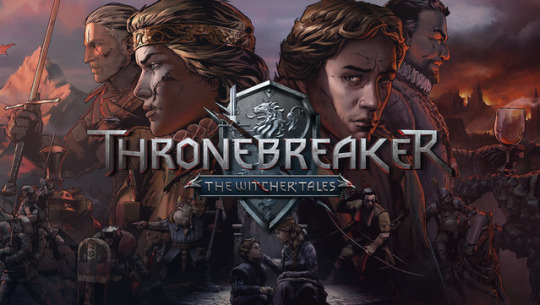
I put about 150 hours into The Witcher 3: Wild Hunt. It’s probably my favorite game ever. I tend to think that I’ve more or less done everything in that game that there was to do, but there is one glaring exception to that: Gwent. I tried a couple rounds of the collectible card game in the beginning of the game, didn’t quite understand what was going on, and certainly didn’t care to learn when the rest of the game offered a big, beautiful world to explore, full of great stories created with near unparalleled writing. I had never really gotten in to card games within video games in general, really - I remember reacting to Final Fantasy VIII’s Triple Triad in much the same way. And I’ve certainly never attempted Hearthstone, or any such similar DCCG’s. This is all to say, I’m still a bit surprised at how thoroughly I fell in love with Thronebreaker: The Witcher Tales, a game built largely around Gwent.
CD Projekt Red’s newest game was released just a few weeks ago to disappointingly little fanfare. What reviews there are have been pretty strong, but let’s be real - this is an isometric RPG with visual novel elements whose combat is based around a card game, and it was released three days before Red Dead Redemption 2. It’s a shame, though, because the game really does offer so much to those who, like me, might be unsure about undertaking such an experience. It’s got a gorgeous, comic-book-esque art style that makes exploring the game’s detailed maps a joy. It’s very well written, with novelistic prose and strong characters delivered by Jakub Szamalek, one of the writers from The Witcher 3. Marcin Przybylowicz returns with another memorable and moody Polish-folk-music-inflected score. While combat is entirely based around Gwent, the rest of this game is devoted to exploring detailed maps and making hard, morally ambiguous decisions in the main story. In other words, the team behind The Witcher 3 made a brand new, full, deep RPG set in the universe of The Witcher, and you really should be paying attention.
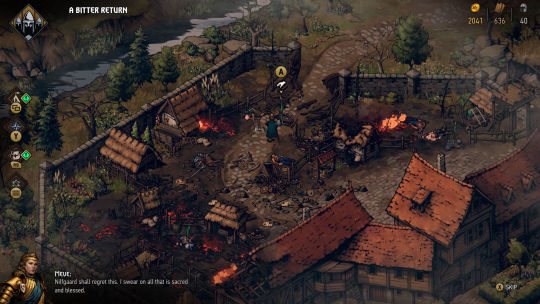
Thronebreaker is a prequel-ish spin-off, set just before the events of the first Witcher game. It centers around Meve, Queen of Lyria and Rivia, and her quest to reclaim her land from a devastating Nilfgaardian invasion. The morally gray nature of The Witcher universe is an even more ever-present central tenet in this game than previous ones, as it deals explicitly with the inherent injustice of monarchical governance. Meve is, as queens go, a very good one. She’s brave, determined, and compassionate, willing to fight to the death for the good of her people. But war nevertheless makes for hard decisions, especially when you’re leading a small army with limited resources against a giant imperial machine, and attempting to navigate the complex politics of multiple lands.
The maps you explore in this game can include big cities and castles, but for the most part, you’re traversing through rural lands, passing by small villages and farms, grappling with the cruelty of feudalism. The peasants you meet have next to nothing to begin with, so often are they forced by the government you rule to give up their earnings, at least in part so that you can live in luxury. Now that war has come around, it only gets worse for them - you physically take resources from them for your army, and often conscript them to join. You stick your nose into local conflicts you don’t fully understand or appreciate. Mass inequality and injustice are everywhere, and try as you might to be a just and fair monarch, you can only go so far when your existence is one of the primary reasons for that mass inequality and injustice.
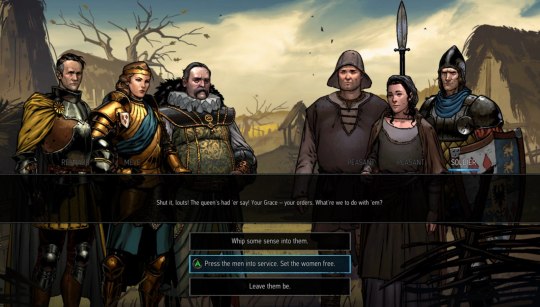
There are rarely “good” options to choose from in this game. A decision always involves a compromise, and no matter what, somebody is going to be made very unhappy by it - most likely including you. There are often more ostensibly righteous or noble options, but the consequences of those can sometimes have an effect that makes you wish you had chosen the other one. “You’ve chosen one evil over another” is a prompt that you get very used to popping up - it’s the game’s sole response to you making a story-altering decision. Sometimes this can feel pretty damn off. Sorry, game, but choosing not to kill a messenger when I’ve just been reminded of the rules of war, or saving an elf from a mob of racist humans attempting a public execution are just not evils, no matter how you look at them. The point of it is showing how your actions, even seemingly altruistic ones, have consequences, and the shades of gray thing works pretty well for the most part, but despite the game’s assurance to the contrary, not every choice you make is an evil one.
The more successful decision making comes when you really feel those consequences, either through a hit to your resources, or a bit of writing that explains what ended up happening. There’s a heavy dollop of Machiavellianism to these decisions, as it often comes down to choosing between what’s right and what’s successful. You need gold, people, and resources to survive. In the early parts of the game, you’re pretty desperate for all three of these things. So when you stumble across an already disturbed grave that has valuables in it, do you pillage it? You want to say no, and yet, you weigh the options - the only negative would be upsetting company morale, but morale is already high after saving a church graveyard from a monster, so pushing it down to normal isn’t a great loss in comparison to leaving behind gold. In that same section, you can chase down a group of bandits that stole gold from the church. After you retrieve it, you can either return it, or keep it for yourself. I returned it, but I didn’t feel quite as great about it as I expected to. Sure, I made a small group of nuns happy, but does this truly benefit the kingdom as a whole if we’re short on money to fight our enemies?
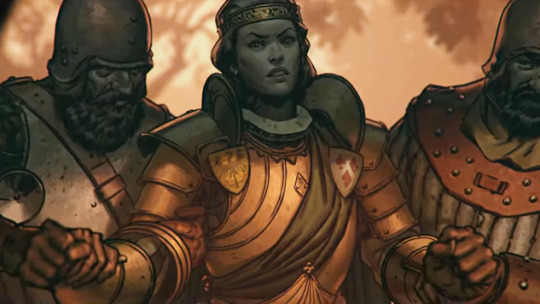
That’s not to say that the game encourages you to make the selfish choice. I’ve heard it claimed before that the Witcher games reward policies of non-interference and cynicism in the face of injustice, but I don’t think that’s necessarily true. Sure, taking the gold for myself would have made the game a little bit easier for me, but that’s temptation, not reward. There’s always a cost for getting involved, but it’s hard for me to see that as the game punishing me. There are consequences no matter what, and this is the rare game with a semblance of a morality system that often makes attempts at doing the right thing the most narratively interesting choice rather than the choice with the most practical reward. This becomes clear in the second chapter, where, after seeing the atrocities wrought by the opposition, you can’t help but become more willing to recognize the cruelty in yourself, to make decisions you never figured you’d make. This wouldn’t feel nearly as impactful if you didn’t start out trying to make Meve the most just ruler possible.
Though the game presents a complex world of bitter division and desperate cynicism, and thus engaging with it leaves little possibility of not getting blood on your hands, the writing rarely feels ignorant of the roots of injustice. The human lands that you spend most of the game exploring are deeply racist. The Elder Races - elves and dwarves, mostly, have been subject to countless pogroms across these lands, and even when they aren’t being straight up murdered, are never treated as equals to their human neighbors. So the fact that the Scoia’tael, a radical group of nonhuman guerillas, exist isn’t surprising, nor can you not have sympathy for their alliance with the invading Nilfgaard. Though the Nilfgaardians can be seen as a stand-in for any massive imperial force, from the Roman Empire to Nazi Germany, with all the delusions of racial superiority that tend to go with empire, their invasion of the Northern Kingdoms actually does seem to make life a bit easier for nonhumans - one of the chief complaints of the humans you meet living under occupation is how many more rights have been granted to elves and dwarves.
The Scoia’tael, fighting for Nilfgaard, thus become another enemy you must face. Some of them, justifiably thrilled at the prospect of overthrowing their oppressors, use the destruction of a kingdom like Aedirn as an opportunity to slaughter whole villages of humans as revenge. You see the mindless violence they’ve committed, then are faced with the threat of it yourself, and there’s really no other choice but to take the Scoia’tael down. It feels terrible. Every aspect of it. And I believe the game earns this trudge through moral quicksand. It recognizes the righteousness of the Scoia’tael, even as it forces you into opposition against them. It’s both awful, and a surprising relief from the social commentary video games so often fall into - the reductive and mischaracterizing Bethesda/Rockstar/Bioshock “both sides suck” approach. It recognizes the power differences at the root of the issue, and doesn’t hide from the ugliness that ensues.
That’s not to say that the writing is always perfect when dealing with this stuff. Cut a single corner with material this volatile and you can end up with a pretty off-putting scene, as Thronebreaker occasionally does. There’s one character, a human named Black Rayla, that joins your team in the second chapter. She’s a seasoned fighter of the Scoia’tel, and thoroughly racist as a result, and yet, she’s useful to your cause, so you allow her in. This is all well and good, and theoretically should make for some interesting internal conflicts, but there were several scenes where I was disturbed by Meve’s lack of response to Rayla’s nationalist bullshit. There was one scene where she was going down some real “I don’t have a problem with them, as long as they know their place” garbage, and I just decided to dismiss her at that point. I wonder what would happen if she stayed with my group till the end, if Meve would have more to say to her after she wasn’t quite as desperate for her help. I’d hope so, but considering the lack of mindful writing around her character I witnessed it, I wouldn’t exactly expect it.
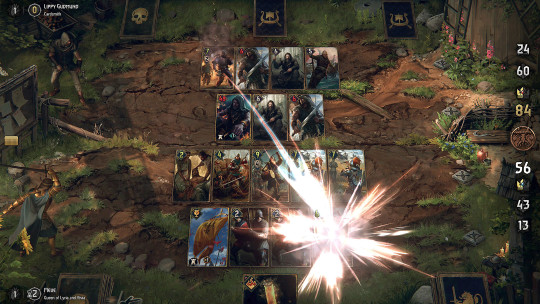
For as fascinating as the narrative of this game is, the thing you’ll probably spend the majority of the game doing is playing Gwent, and for a solid two-thirds of my time with the card combat, that was something I was very happy to be doing. The system built for this game, similar to, but modified from its Witcher 3 iteration, is deep, strategic, and occasionally pretty challenging. It feels made for newcomers like myself, mostly unfamiliar with Gwent, or even the standard mechanics shared by most card games, in the way that it eases the player into it. The first hour or so of the game is the official tutorial, but really the whole first chapter feels like a fairly natural extended tutorial for beginners, starting you off with a fairly limited deck in order to solidify the basics. For the most part this is very well done, though there were some particular aspects of the game that didn’t seem to be entirely explained, and took me a pretty long time to pick up on exactly how they worked.
The biggest strength that the card game here boasts is real variety. So many of the battles have particular rules or cards in play that drastically change the way you have to approach your strategy. Many of these come in the form of “puzzles” - aptly titled special battles where you’re given a specific set of cards and there’s really only one solution that you have to deduce through experimentation and logic. These are largely fantastic, not only because they’re all unique and fun in their own right, but because they often serve as mini-lessons in how individual units work and the various strategic ways they can be utilized.

Then there are the standard battles, where you actually get to shuffle and draw your own deck. The designers clearly put a lot of effort into the variety here as well, so often do they throw in inventive special rules and objectives, a lot of which not only change the pace of battle in meaningful ways, but often weave narrative significance into play as well. One of my favorite feelings in this game was getting stuck on a battle because of its particular rules, banging my head against it for a little while, then just suddenly seeing it, and pulling a satisfying victory just before it would’ve started feeling frustrating.
For as much thought and care as was clearly put into the design, though, there’s really only so many ways to keep combat interesting and engaging through a campaign that can last as long as fifty hours. In the back half of the game, combat can too often feel like a grind. At this point, you’ve got a big, diverse deck with plenty of powerful cards that makes it too easy to brute force your way through most situations. I found myself repeating the same tried and true tactics over and over again to bring my game to a speedy end so I could just move on with the story, which I was still very much enjoying. It’s hard to know if more work could have been put in to truly keep the card game feeling novel - Gwent just generally loses its depth once you’ve got mastery over a sturdy deck. I think ultimately, the game is just too long - possibly by even as much as ten hours or so, honestly. That’s not to say that I outright stopped enjoying it at any point; this is unquestionably one of my favorite games of the year, but if I didn’t have to face that grind in the final couple chapters, it very well could have been a contender for the top spot.
It feels a bit too long in the narrative sense as well. Not necessarily the written aspect of the narrative - that all felt consistently strong and inspired throughout the course of this game. But the mechanics surrounding the narrative, in particular the hard decisions you have to make as a result of limited resources, fall flat once the in-game economy feels maxed out. By the final chapter, all my upgrade trees were completely filled and I found myself sitting on a growing surplus of funds, and suddenly making the “right” decision didn’t feel quite as hard.

Despite its cumbersome length, few games surprised and enchanted me this year as much as Thronebreaker. The challenging and compelling role playing, the satisfying card combat...hell, even if that stuff wasn’t as outstanding as it is, I probably would have been happy to spend a considerable amount of time in it for its art style and music alone, so thoroughly did it soak me in those intoxicating Witcher vibes. It made me very excited at the potential CD Projekt Red still has in it for finding innovative and novel approaches to fresh storytelling in a well-worn universe, and I just hope that potential can continue to be realized after the distressingly muted reaction to this game’s release. Here’s hoping that its recent addition to Steam, and its upcoming console release, allows it to find the audience that it deserves.
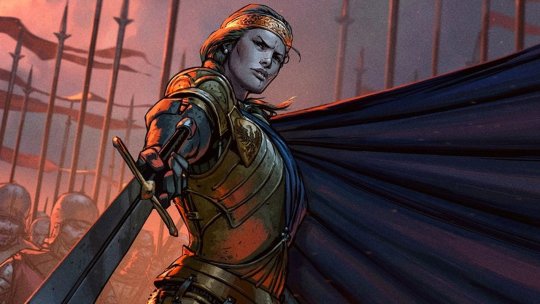
#Thronebreaker: The Witcher Tales#Thronebreaker#The Witcher#Witcher#CD Projekt Red#Cyberpunk 2077#RPG#Role Playing Game#Card#Cards#CCG#DCCG#Collectible Card Game#Digital Collectible Card Game#Review#Criticism#Podcast#Video Games#Politics#Games
54 notes
·
View notes
Text
Loki's Apology
By: jotun-philosopher
A/N: I thought this up almost in its entirety while very bored at work. I kind of imagined it as being a stinger to an episode of Agents of S.H.I.E.L.D. that takes place at some point after Thor 3, hence the TV-script format. Further wibbles after the speech, so I don’t put you off with rambling XD
==================================================
[nervously but trying to hide it]
Umm… Ah… Heh.
[fidgets awkwardly with his left palm]
People of New York – people of Midgard – I am Loki, of Asgard, and I…
[rests his face in his hands for a moment, takes a breath as if to nerve himself for an emotionally difficult task]
I would like to formally apologise for attacking New York, for bringing the Chitauri army crashing into your world, and for the destruction and death that they and I brought, during both the battle itself and the events leading up to it. This was wrong – utterly, indefensibly wrong – and I am sorry.
[swallows, fidgets with his fingers, glances briefly to one side]
I must also apologise directly to certain people. To Agent Philip J. Coulson of S.H.I.E.L.D., for kill— stabbing you; to the Avengers, for so gravely hurting someone you all had good reason to care about. To Dr Erik Selvig and Agent Clint Barton, and the others I controlled, for suborning you with the mind-bending sceptre and leaving you with such unpleasant after-effects on your physical and mental health. To Agent Natasha Romanoff, for my cruel words and disturbing threats. To Dr Bruce Banner, for my contempt and dismissal of you as a monster and mindless beast, when in truth you are so much more than that.
To my brother, for… for everything.
[his lip wobbles and he looks, for the briefest of moments, as though he’s about to break down crying; the emotional strain is certainly clear in his face. He collects himself and continues speaking, but with a noticeably more shaky note in his voice]
You may well have seen, in the data dump from the time of the old S.H.I.E.L.D.’s collapse, security footage of my arrival at Project Pegasus showing me seriously ill from heat exhaustion and barely able to stand at points. You would be correct in… in concluding from this that there is a more serious context for my association with the Chitauri than might previously have been supposed. H-h-however, this does not justify or excuse m-my a-actions in any way. I am, once again, truly s-sorry.
[looks away from the camera and takes a few deep breaths, very obviously trying to get a sudden influx of bad memories under control. When he continues, he speaks more quickly than before, with far more emotion, sounding scared and as if he’s about to cry]
I know that the losses which you have suffered – which I have inflicted upon you – hurt terribly, and may always do so. But, I beg of you, do not let your pain make you hateful. Be better people than I have been – do not let your grief and hurt lead you to lash out and inflict that same hurt on others who are entirely unconnected to the circumstances of your loss.
[takes a few deep breaths, seems to collect himself somewhat]
Th-thank you for listening.
[subtly mouths “I want my mother” as the shot fades to black]
==================================================
A/N: Welp, I hope you enjoyed that! :D I imagined it as an AoS stinger, like I said, but that was the only thing about the scenario that was really solid, because I wasn’t sure what’d go down best with the in-universe people at whom this apology is directed. Did Loki make the apology on his own initiative, or did S.H.I.E.L.D. persuade/convince him to do it (and how?)? Posted to Youtube, put on the news, or stop-the-presses special broadcast? Live or pre-filmed? Filmed in S.H.I.E.L.D. HQ or somewhere else (crappy bedsit, abandoned warehouse, swanky hotel, etc.)? Is Loki’s hair neat or messy? Is he wearing a Midgardian suit, his usual leathers, his full armour inc. cape (with or without that yummy helm), Midgard casual, his ‘neat’ prison attire or his ‘ragged’ prison attire? Does he look reasonably fit and healthy, or distressed/ill/lacking sleep? You decide, I guess ^^ Thanks for reading! :)
14 notes
·
View notes